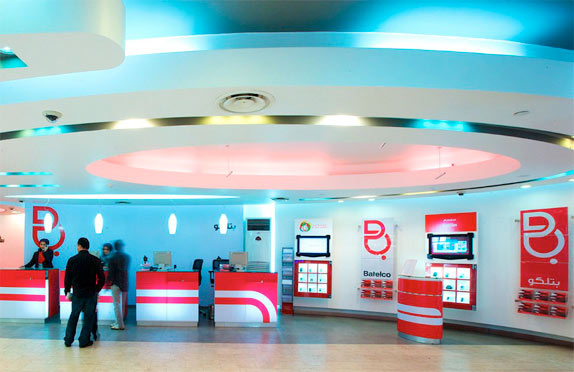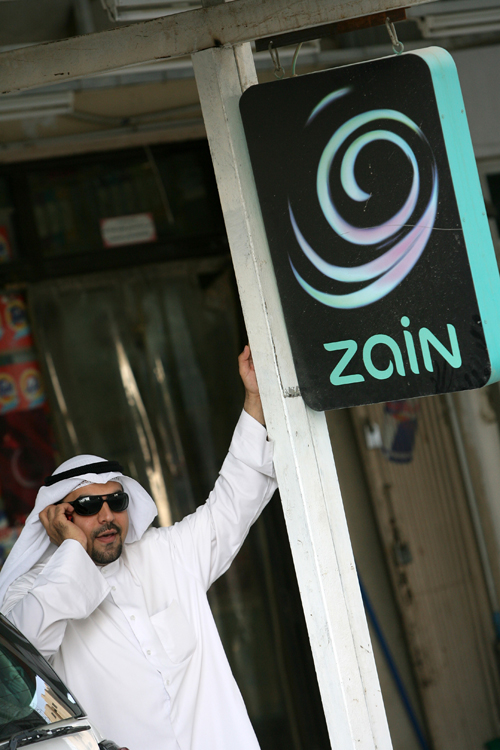Batelco’s Acquisitions, Vision and Strategy
One might think that Batelco was upset over the loss of its monopoly position. But that is what makes the story of Bahrain’s telecommunications liberalization so interesting. Instead of fighting to maintain its position, Batelco welcomed it. When Peter Kaliaropoulos, CEO of Batelco, was asked whether competition has helped Batelco, he replied “Emphatically yes!”

Bahrain Telecommunications Company (Batelco)
Batelco’s Vision
Batelco’s Acquisition and Management Style
Batelco’s Grand Strategy
“Has competition helped Batelco? Emphatically yes!”
One might think that Batelco was upset over the loss of its monopoly position. But that is what makes the story of Bahrain’s telecommunications liberalization so interesting. Instead of fighting to maintain its position, Batelco welcomed it. When Peter Kaliaropoulos, CEO of Batelco, was asked whether competition has helped Batelco, he replied “Emphatically yes!”
growth of the market from less that 0.4mn mobile phone customers in 2002 when the liberalization began, to more than 1.5m mobile customers today.
“Loss of monopoly some years back has helped us,” Kaliaropoulos says and explains: “Loss of market share is inevitable by definition, but we have grown our business in Bahrain because all the telecom companies have grown the market” referring to the growth of the market from less that 0.4mn mobile phone customers in 2002 when the liberalization began, to more than 1.5m mobile customers today.
The first—and main benefit—he says, is that: “Competition has focused us with some “considerable obsession” on improving the customer experience. We measure service levels for various customer segments and product performance and we continually improve our processes to deliver a better quality and more consistent experience to our customers, especially for the high value consumers and businesses.”
The second benefit, Kaliaropoulos says, is that “Competition fuels innovation,” Thus, he says that, “despite the small size of our market [compared to neighboring nations], the most advanced fixed and mobile solutions and services…which are typically found in sizable markets are also available in Bahrain.”
Batelco’s Vision
On this credo of welcoming competition—and on Batelco’s success at continuing to grow despite the entrance of major competitors into the market—Kaliaropoulos has developed a far broader, dual vision for Batelco for the future. On the one hand, Batelco is proud of the role it has played and continues to play in the development of Bahrain.
“Telecommunications provide the backbone for the growth of any economy and in Bahrain we have witnessed massive growth and development in recent years. Batelco continues to be the builder of national and international digital highways and knowledge hubs linking Bahrain to our global village. We take this responsibility seriously and with pride – we have built and manage significant fixed and wireless advanced infrastructure allowing Bahrain to showcase global events such as the Formula 1 and linking Bahrain, the financial capital of the Middle East to the global banking, insurance and financial hubs.”
“Batelco’s excellent infrastructure is also underpinning the Kingdom’s ‘Business Friendly’ drive. We have convinced many corporate and global companies to place their IT hubs, data centres and call centres in Bahrain. Companies such as BNP, DHL and Cisco would not take the risk if Bahrain didn’t offer world’s best class infrastructure.”
On the other hand, Batelco’s attention to customer satisfaction leads it to carry its experience beyond Bahrain to become a major regional player.
“Our vision is driven by our desire to create a company of reference in the MENA region, India and Asia compared to our peers. Our growth strategy is transforming Batelco to a regional mobile, broadband and ICT company with our aspiration being to operate across 10 countries in the future and to have 80% of our revenues from our overseas operations to ensure we have significant diversification.”
“Longer term, the Batelco Group will be a key member of a regional and global strategic alliance with another telecommunications company, known for its innovation and service excellence.”
Batelco has already expanded into India and four other nations of the MENA (Middle East/North Africa) region. The Batelco Group of Companies includes the following operations, subsidiaries, and joint ventures: Batelco Egypt; Umniah Jordan; Quality Net Kuwait; Sabafon Yemen and S Tel in India; and is in the process of acquiring a 25% stake in Zain Telecom of Saudi Arabia.
“[T]he opportunity to acquire Zain is critical to our growth strategy and if the deal is successful will be complimentary to our operations in Bahrain, Jordan and Yemen,” says Kaliaropoulos: “Batelco Group’s 10.2 millioncustomer base and experience from the regional market will complement Zain’s 8.5 million customer base and allow for synergies and benefits to be delivered quicker to Zain.” 
Batelco already holds a 15% stake in fixed line operator Saudi Atheeb, while Zain Saudi does not hold a license to run a fixed line.
Batelco’s Acquisition and Management Style
Unlike many service or retail companies that begin expanding internationally, such as McDonalds or Starbucks, Batelco does not have a rigid formula for success, or even a uniform brand name. Rather, its style is to look for pragmatic results that are successful, and incorporate the local experience. Kaliaropoulos explains it this way:
“We have learned to respect the value other management teams have to offer. Following an acquisition, as we have done on a number of occasions in the last few years, we search for “best practice” in the new company. Where is the talent and what are they doing better? Yes, cultural differences exist, but all competitive companies are run by businesspeople and driven by setting and achieving goals. We find very quickly we have more similarities rather than differences with management teams in a company which we acquire.”
“We do have to win the leadership and employees of the new company and do so a transparent and consultative way. Occasionally we have to dictate best-practice principles and corporate governance as a publicly listed company. We approach everything through facts, figures, research and rational dialogue, and in this way about 95% of opportunities and problems get solved. Pure intuition, when running a complex business, is not enough but helps address the remaining 5%…”
“In mature markets we pay attention to detail, engage and listen to the leadership teams, encourage them and stretch them with KPIs. It is important to have a great relationship with the leadership teams in operating companies. They should have freedom to operate, but also be held accountable for the results they obtain, rewarded for success and learn from failure.”
In regard to branding, Batelco’s approach is to forego a single name or logo, and to seek to be as local as possible even as far as having a local name. Kaliaropoulos explains it this way:
“Local familiarity is important to our strategy. In all markets we operate we now have a local brand – Sabafon in Yemen, Umniah in Jordan, QualityNet in Kuwait, etc. Whilst we have the industrial strength of the Group of companies and enjoy synergies, we clearly differentiate via our local brands to be more relevant to the local based consumer clients rather than a monolithic brand and be perceived as a foreign company in emerging markets.”
As a result, he says, that Batelco’s approach is to have its ear as close to the ground as possible:
“Understand more than just the normal statistical and historical information about the new markets and/or companies. We do a lot of “homework” before and during the transaction. Get to understand the peculiarities of the local market by spending time on the ground talking to as many relevant people as possible. Understand the strengths of the local management team. Understand what’s behind the numbers and what will drive sustainable growth. If you don’t have a strong, local partner, you are setting yourself up for lots of hard work ahead of you. We listen to internal and external advisors but challenge them. Transfer knowledge quickly and realize economies of scale or revenue synergies even quicker. Finally, if the local management team has hunger and passion to succeed, back them up. If not, we do (unfortunately) micro-manage till the right team is in place.”
Batelco’s Grand Strategy
Batelco’s long term strategy is to look at the mega-trends in both industry and the region. “Strategically,” says Kaliaropoulos, “we foresee tremendous consolidation within the next five to ten years. 
With increasingly high levels of penetration in various countries, the days of standalone telecoms operators with small customer bases are over. Groups of companies, driven by common goals and sharing knowledge and market practices, have a chance to be more successful than a stand alone operator.”
As a result, Batelco is setting its sites on joining with other companies who are interested in combining talents and synergies to serve the market better, and grooming the Batelco Group of companies to become desirable partners for future mergers or acquisition:
“In this context, we are focusing on creating shareholder value which will make Batelco an attractive partner. This involves increasing revenues through new products, diversifying our geographic footprint and increasing our customer base. We will also benefit from economies of scale, in order to reduce the cost of purchasing equipment and to allow us to reach a larger customer base. For the telecommunications companies of the future, which are all about multimedia and delivering information, scale is very important.”
Overall, says Kaliaropoulos, “Our growth strategy is based on developing a strong footprint in the Middle East.”
“We aspire to become relevant to more customers in more markets, and eventually to establish ourselves as a leading regional company with a strong mobile broadband customer base. In the future, our industry will involve more than just voice communication and SMS which are the current revenue and profit foundations. Operating value will be created based on delivering multimedia applications across multiple devices. The larger our customer base the better chance we have to deliver that content faster, better, cheaper.”
“Back to Basics”
But all of Batelco’s approach, philosophy, and distinctive style comes down to one simple bit of wisdom that applies at every level. Kaliaropoulos calls it “Back to basics,” which he explains this way: “Batelco’s proposition is “backto-basics”. Deliver consistently, deliver value, deliver innovation, be responsive to customer needs and lead in product/ service development.”